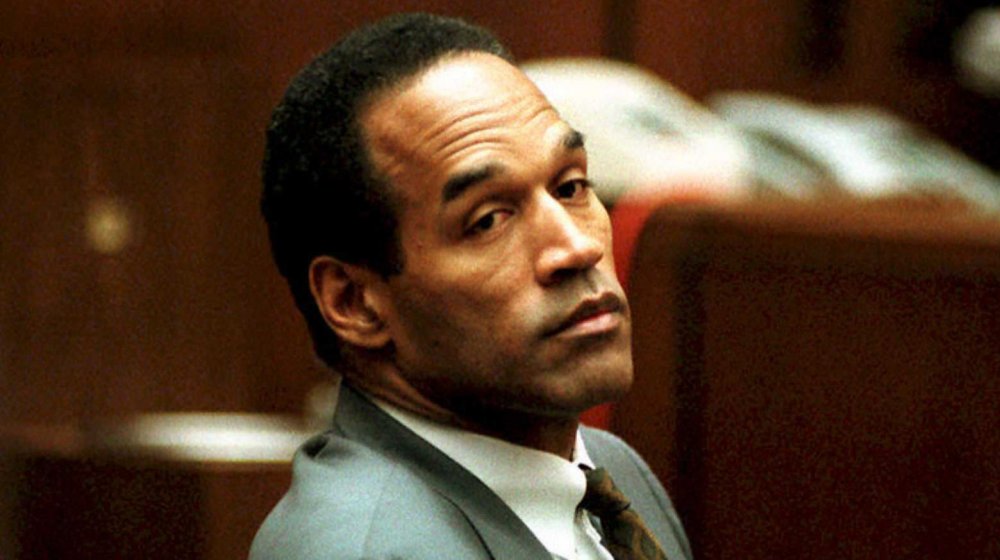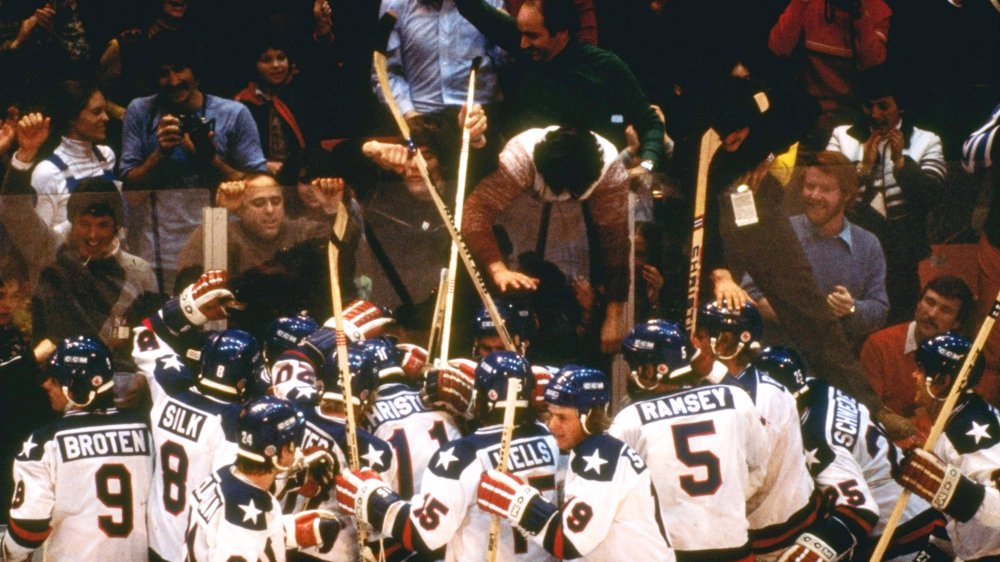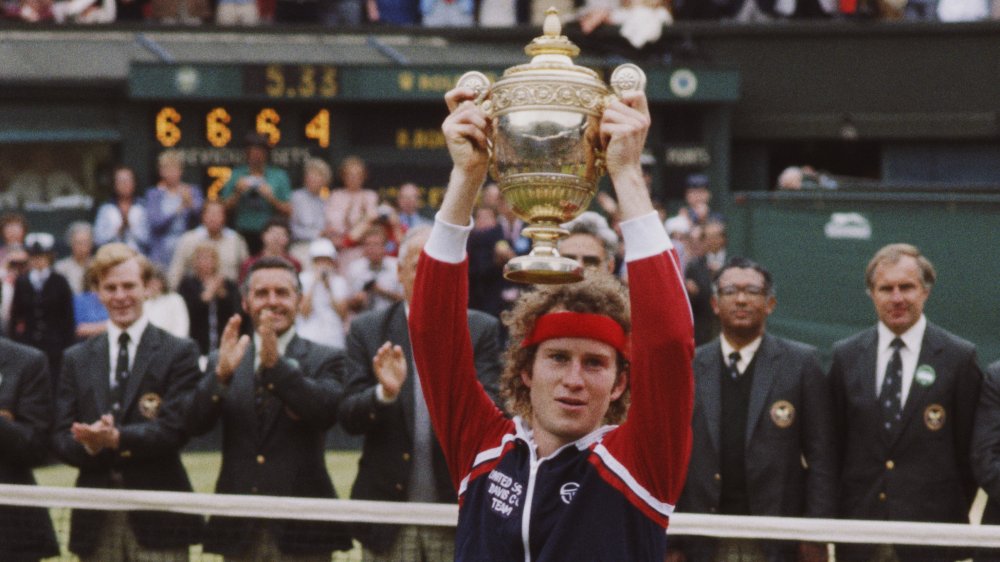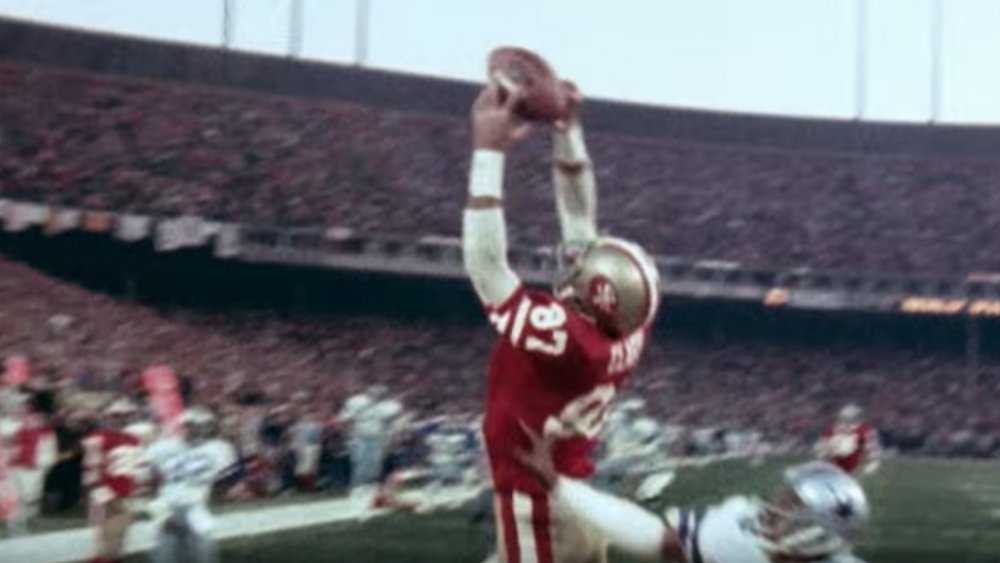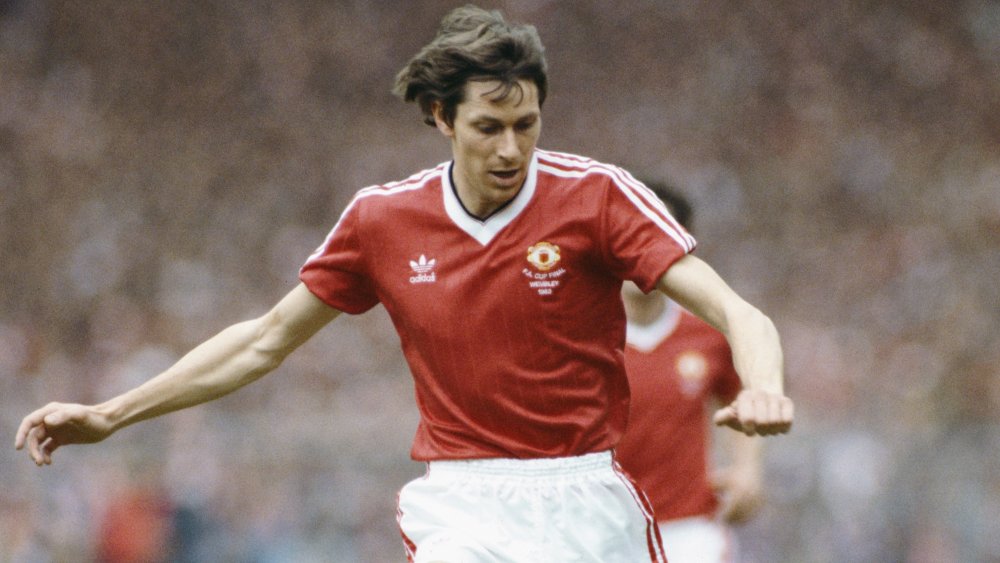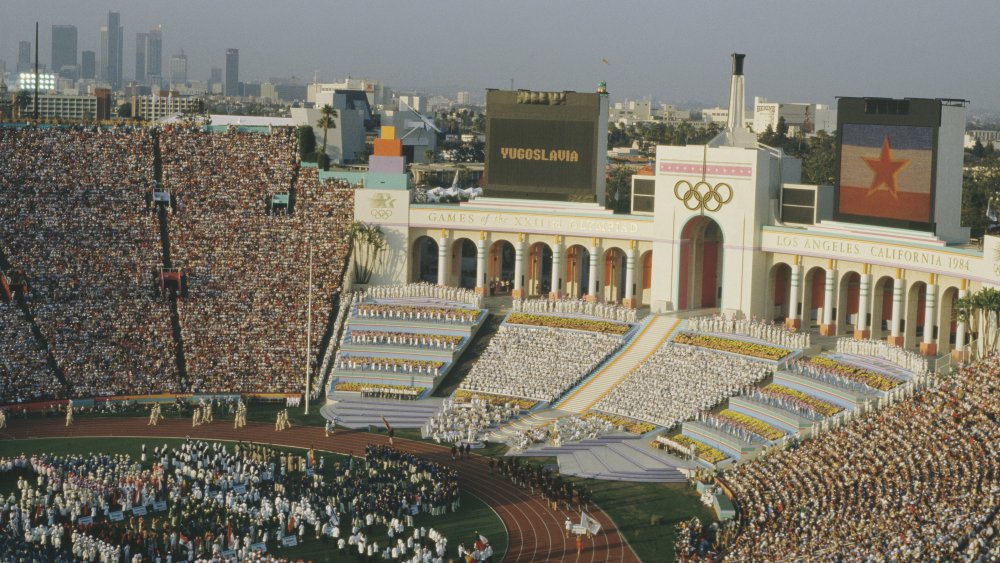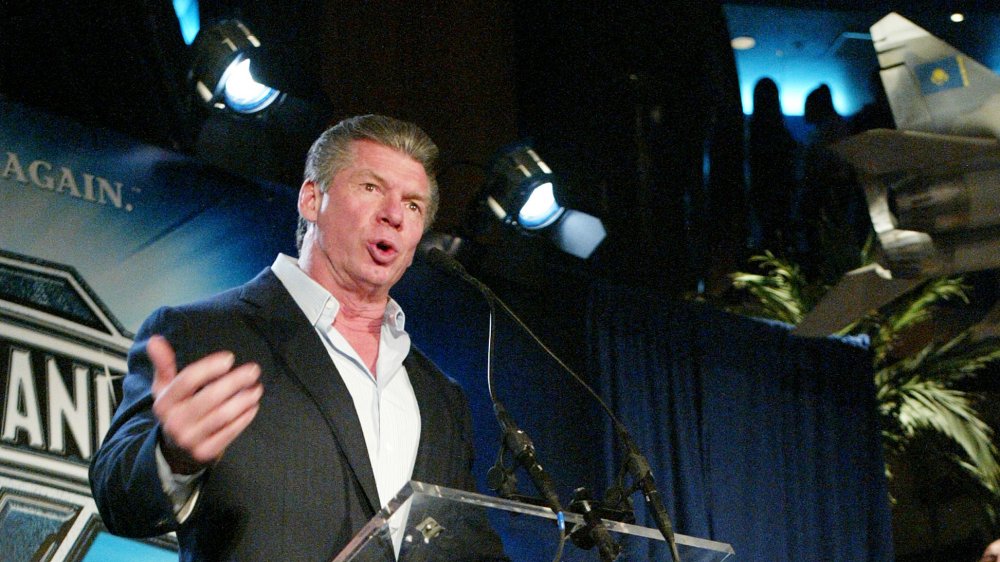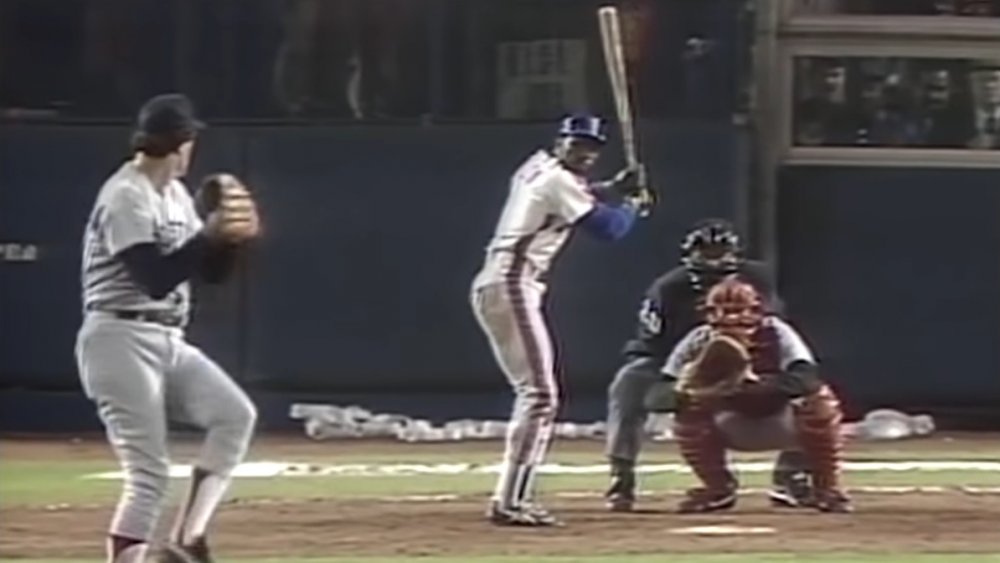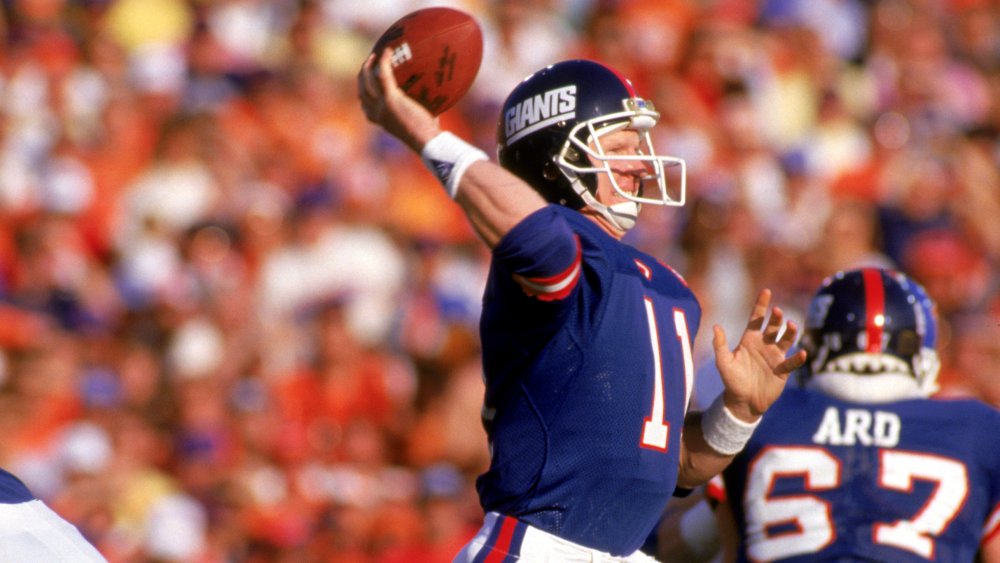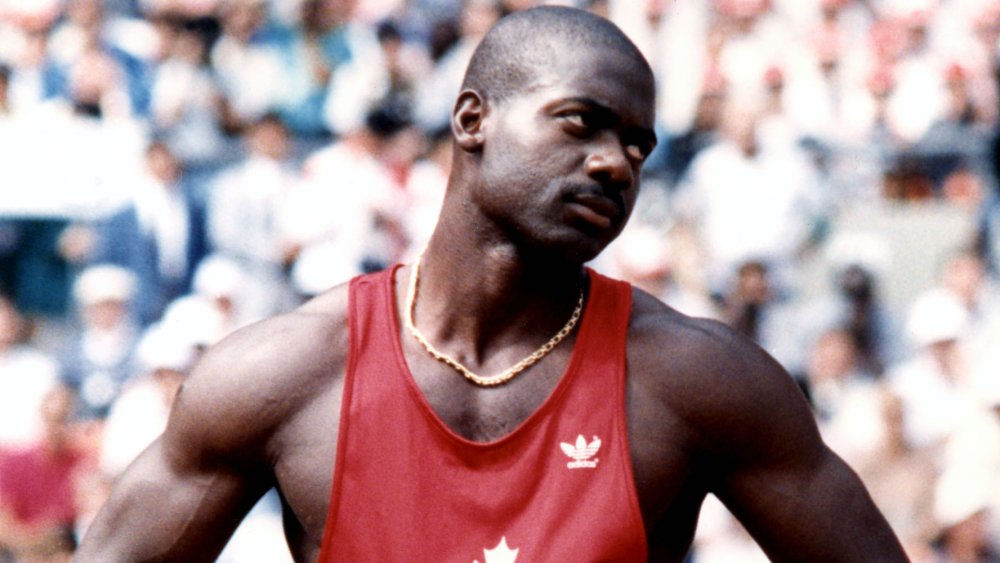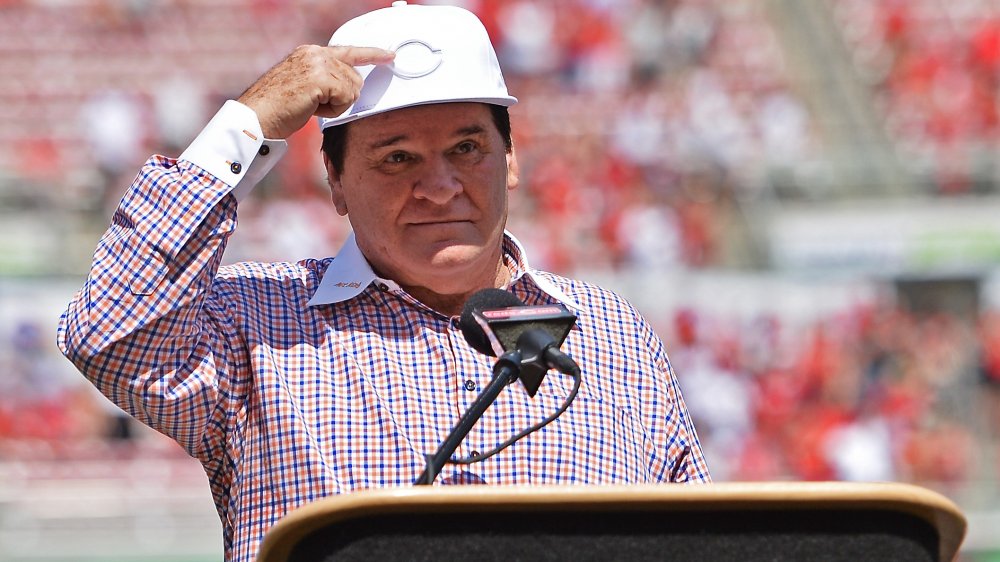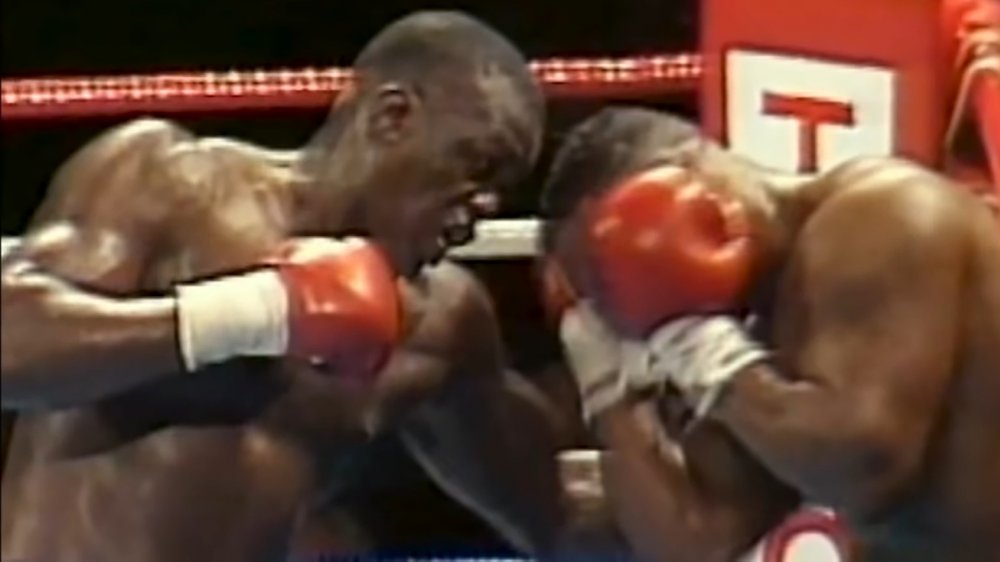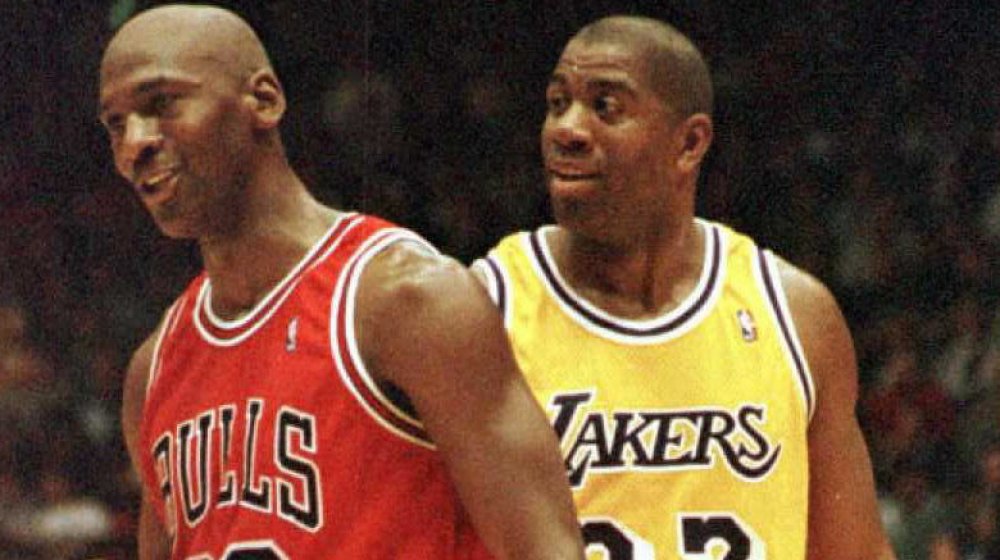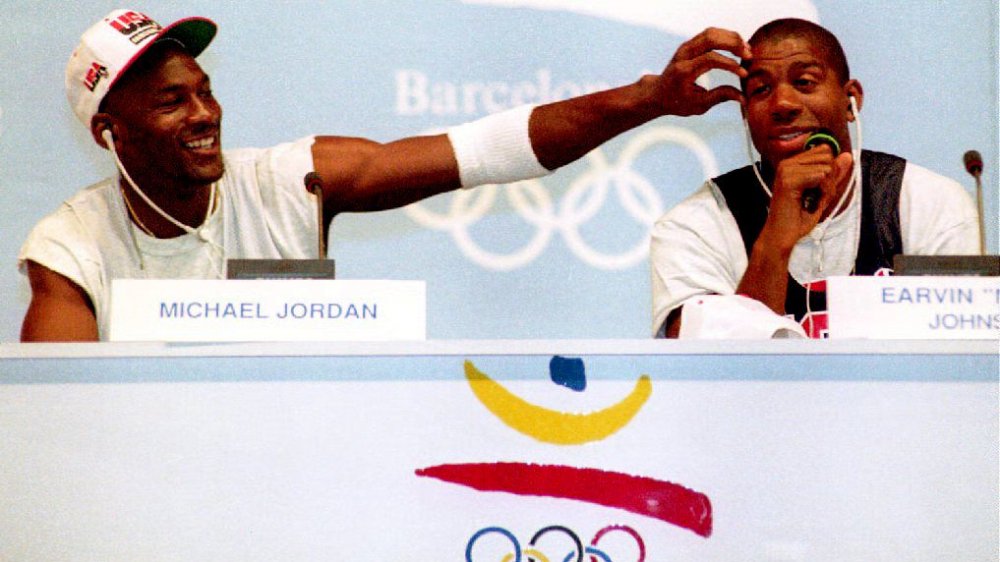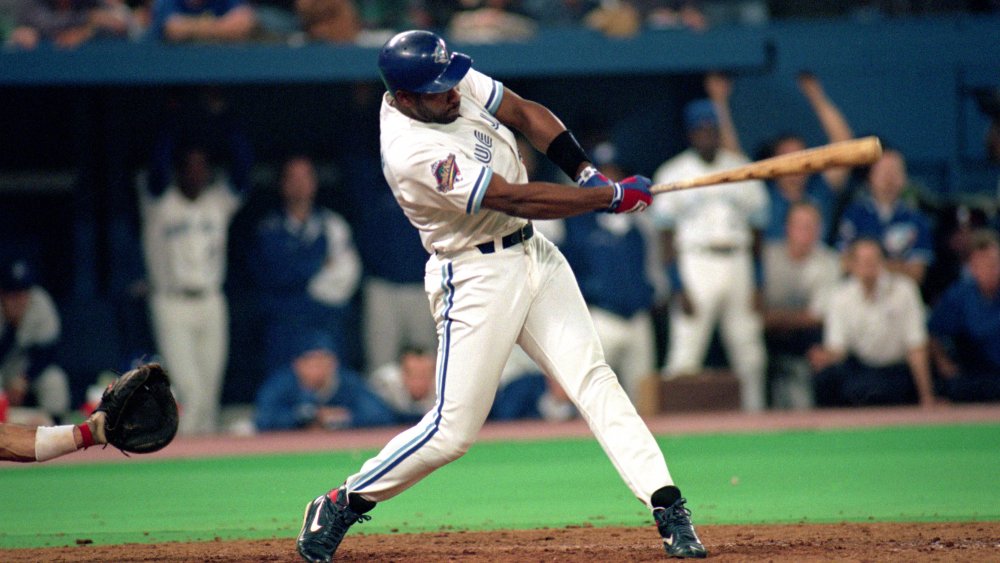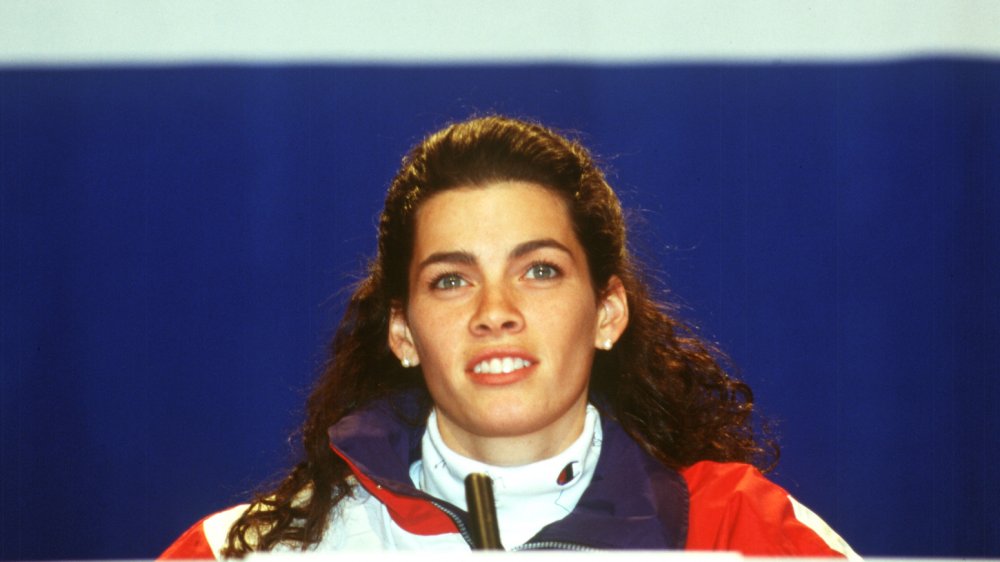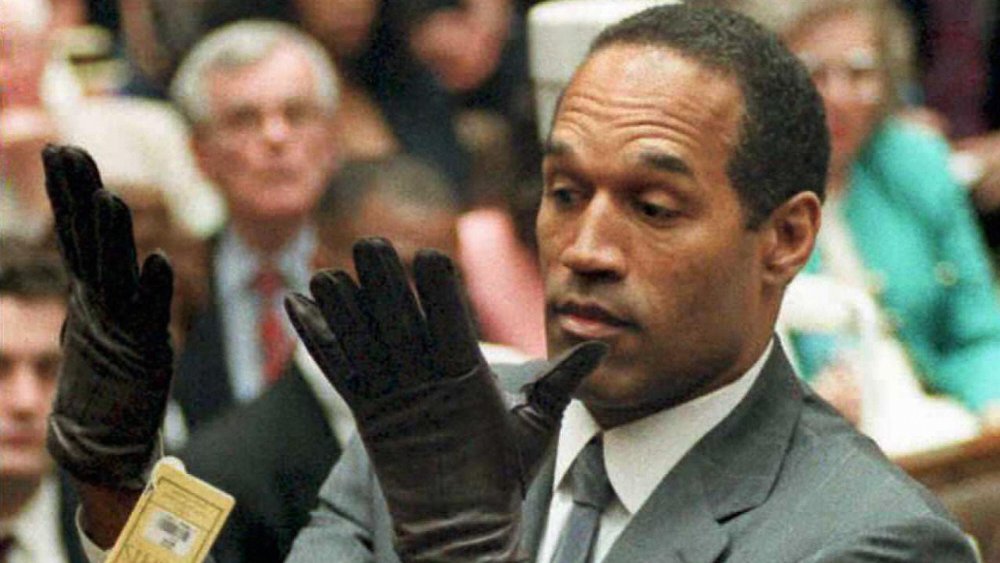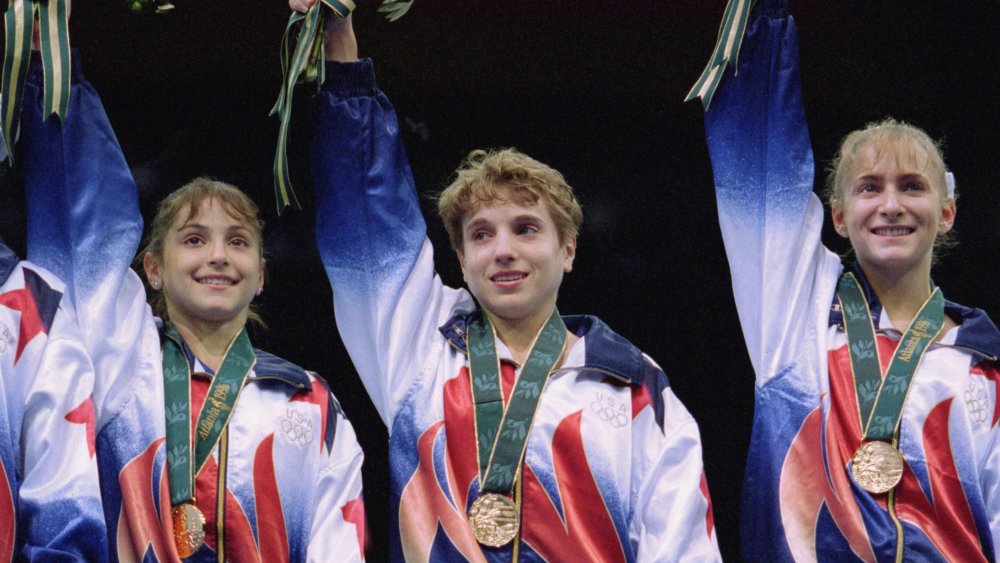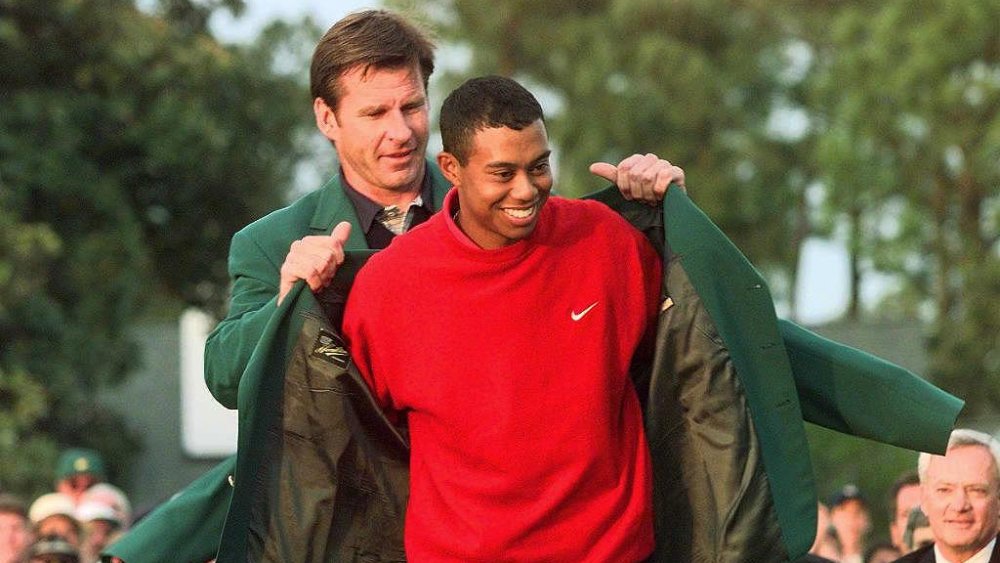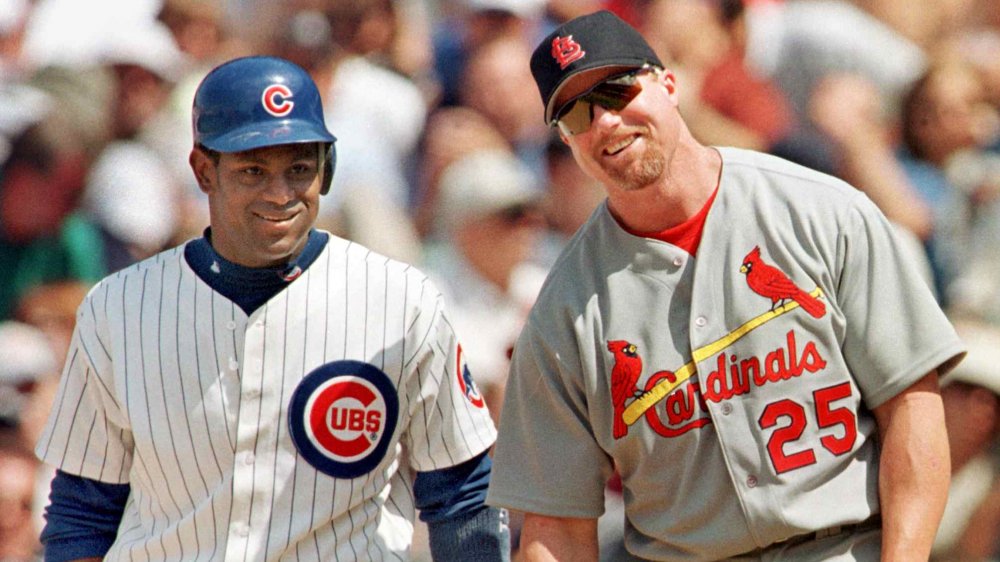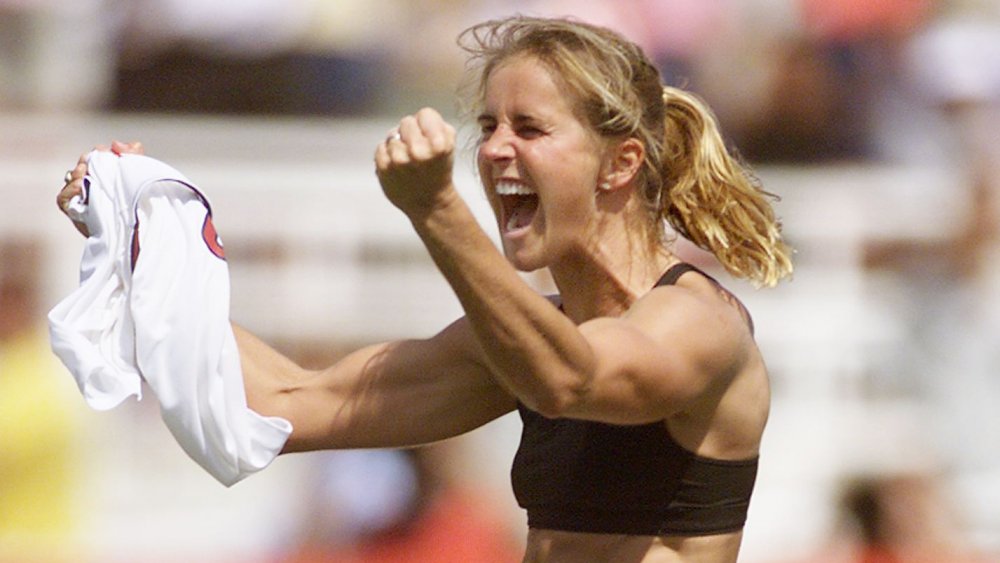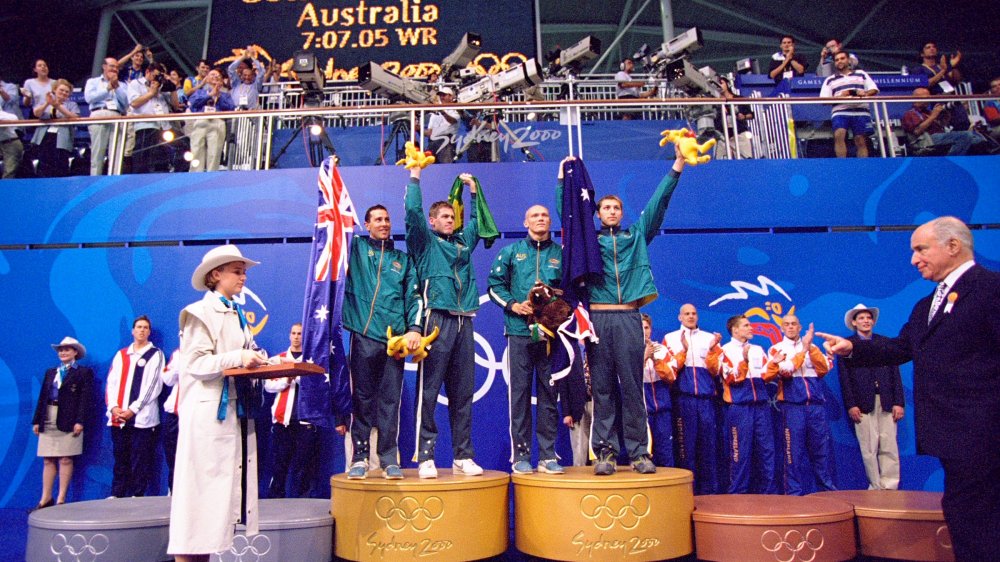The Biggest Sporting Moment The Year You Were Born
"More than just a game" isn't merely a saying that diehard sports fans casually throw around. Domestic and international sports have significant cultural and social affects that last for generations. For many, the memory of a thrilling hockey game or an intense soccer match brings back fond memories, feelings of pride, and even a bit of adrenaline. And on the other hand, there are those landmark sports moments that cause some fans to curse an opposing team, a star player, or a celebrity who wound up in the headlines for the wrong reasons.
Really, each and every year has its own incredible sports moments, but there's always one play, move, or match that stands above the rest. And regardless of when you were born, it's a guarantee that some famous, or infamous, sports moment is associated with that year. So today, we're going to look back in time and explore the wins and losses, victories and defeats, and all the other crucial moments in the wild world of sports. From baseball games to boxing matches (and even a bit of courtroom drama), keep reading to find out the biggest sports moment in the year you were born.
1980: Do you believe in miracles?
Between 1956 and the start of the 1980 Winter Olympics, the Soviet Union won Olympic gold in ice hockey five out of six tournaments, and the Soviet squad — filled with professionals — was expected to again emerge as the last team standing during the 1980 Games held in Lake Placid, New York. Meanwhile, a young United States roster that consisted of amateur players hoped to merely earn a medal on home ice.
Few, if any, gave the Americans a chance to make the contest a close encounter when they faced a Soviet side that outscored opponents 51-11 through their first five outings of the Olympics (per the US Hockey Hall of Fame). The US trailed after two periods, but the home side rallied from behind and scored the game's final two goals for the historic and shocking upset win. Broadcaster Al Michaels delivered a call for the ages in the closing seconds when he proclaimed, "Do you believe in miracles? YES!"
This one moment became so iconic that some forget the United States didn't win gold that fateful evening. Two days later, the 1980 US Olympic hockey team knocked Finland off in the final to complete what Michaels famously referred to as "the impossible dream."
1981: You cannot be serious!
The "fire and ice" rivalry between John McEnroe and Bjorn Borg was one of tennis's greatest feuds of the late '70s and '80s. The loudmouthed McEnroe and more reserved Borg met in the 1980 Wimbledon Final, which Steve Tignor of Tennis.com once referred to as the second greatest final ever played at the All England Lawn Tennis and Croquet Club. Borg emerged victorious following a hard-fought, back-and-forth battle.
Before McEnroe could receive an opportunity to avenge that defeat to his Swedish rival in 1981, he first needed to notch wins over several opponents, including Tom Gullikson. Non-tennis aficionados likely only recognize Gullikson's name because he was on the opposite side of the net when McEnroe screamed "you cannot be serious" after the umpire incorrectly ruled one of his serves out. Neither McEnroe's talent nor his temper was anything to joke about at the start of that decade. He qualified for the Wimbledon Final and then beat Borg in three consecutive sets to earn the title.
While the 1980 final was unquestionably the more entertaining affair, McEnroe's outburst, which he's parodied over the years, and the first of three Wimbledon triumphs make the 1981 tournament all the more memorable.
1982: The Catch
Ask a baseball fan who was around during the 1950s about "the Catch," and he or she will probably say something about the famous play involving Hall of Fame outfielder Willie Mays. On the other hand, NFL viewers who either fondly or reluctantly remember the 1982 NFC Championship Game between the San Francisco 49ers and Dallas Cowboys would probably think of something that occurred nearly three decades after Mays tracked the ball down in center field during the 1954 World Series.
With the Niners trailing 27-21 in the fourth quarter of the game played in San Francisco, quarterback Joe Montana guided his team's offense to the Dallas six-yard line. As 58 seconds remained on the clock, the signal-caller rolled to his right to avoid pressure from four would-be tacklers and lobbed a pass toward the back of the end zone that seemed headed toward the stands. Wide receiver Dwight Clark rose high above his defender, grabbed the ball, maintained possession, and landed both feet inside of the end zone for the game-tying score. The subsequent extra point gave San Francisco the slightest-of-margins victory.
In 2016, NFL Films named Montana-to-Clark the second greatest catch in NFL history. After that play, the 49ers went on to win five Super Bowls between January 1982 and February 1995.
1983: Manchester United and Tottenham Hotspur play live on TV
In the 21st century, it's almost difficult to believe that there was once a time when stations that showed live sports shied away from soccer coverage. At the end of the 2010s, more live football is aired around the world than at any point in history. Competitions such as the Premier League, Serie A, La Liga, Champions League, and even the Australian A-League secured international broadcast rights throughout multiple countries.
As described by the Daily Mail in 2013, English football fans only received the joy of catching live top-tier league football on their television sets in October 1983. That holiday season, the BBC made history by showing its first live game from start to finish, a clash involving Tottenham Hotspur and Manchester United. United won the contest played at Old Trafford by 4-2. Needless to say, the business of soccer grew exponentially over the following 36 years. According to The Guardian, 41 Premier League matches aired live in the UK over the 2019 festive period.
1984: Countries boycott the 1984 Summer Olympics in the USA
Between 1933 and the start of 1984, the United States failed to host a single Summer Olympics. Four years before Los Angeles hosted the Games, the US led a boycott of the 1980 Moscow Olympics as a response to the Soviet Union's invasion of Afghanistan, per The New York Times. According to the US Department of State, 64 nations followed suit and refused to participate in those Games.
Thus, the Soviet Union and other countries from the Eastern Bloc elected to boycott the '84 Olympics. According to the BBC, 14 nations skipped those Games. American viewers probably didn't bemoan the lack of competition in multiple sports. The host nation earned 83 gold medals, a record at the time, and Carl Lewis became a hero in his home country after he won gold in four events.
The International Olympic Committee (IOC) also had millions of reasons to be happy following those Games regardless of the boycott. According to that organization's official website, the '84 Olympics "produced a healthy profit of USD 223 million and became the model for future Games."
1985: WrestleMania changes sports entertainment forever
Over the decades, individuals such as Bleacher Report's Ryan Dilbert and iconic pro wrestling announcer Jim Ross have speculated on what would've occurred had the first WrestleMania flopped. As both of those men explained, Vince McMahon, the chairman of what was then known as the World Wrestling Federation, invested quite a lot into that first production held at Madison Square Garden in March 1985. It's possible what became World Wrestling Entertainment, the largest pro wrestling company in history, would've either remained a smaller organization or faded from existence completely if WrestleMania I failed to attract much of an audience.
Of course, McMahon's bargain paid off in a big way. In the spring of 2019, WWE celebrated its 35th edition of the "Showcase of the Immortals." Former UFC champion Ronda Rousey headlined the event that occurred at MetLife Stadium, the playing home of both the New York Giants and New York Jets. As of the start of the 2020s, no combat sports organization had produced a yearly show that rivaled WrestleMania in spectacle, size, or in the amount of mainstream attention received. In fact, the entire weekend leading up to each WrestleMania became a sort of wrestling convention for fans.
1986: Mookie Wilson at bat
Just 17 years after the "Miracle" New York Mets went from worst to first and won the 1969 World Series, fans of the Amazins again looked for assistance from the proverbial sports gods. The Boston Red Sox held a 3-2 advantage in the 1986 World Series when the visitors took a two-run lead in the top of the tenth inning of Game 6. All seemed lost for the hosts at Shea Stadium after New York's first two batters of the bottom half of the inning went down quietly, but the Mets refused to die. After Ray Knight drove Gary Carter home, Mookie Wilson stepped up to the plate.
Boston reliever Bob Stanley, brought on to replace Calvin Schiraldi, threw a wild pitch that allowed Kevin Mitchell to score the tying run and Knight to advance to third. Wilson then hit a slow roller toward first base that should've easily been collected by Bill Buckner, but the ball went between Buckner's legs as Knight galloped home.
Years later, Mets fans memorized Vin Scully's legendary call of the game's final play, which goes, "Little roller up along first. Behind the bag! It gets through Buckner! Here comes Knight, and the Mets win it!" The Mets went on to win Game 7 and the championship. Boston fans had to wait until 2004 for their beloved club to reverse "the Curse of the Bambino."
1987: Phil Simms is (nearly) perfect at Super Bowl XXI
The so-called "Wildnerness Years" for the New York Giants and the days of quarterback Phil Simms being booed by Big Blue fans were barely memories when the G-Men earned a berth to Super Bowl XXI and a date with the Denver Broncos. The Broncos had eventual Hall of Fame signal-caller John Elway under center for that championship contest. Decades after this game, most — if not all — knowledgeable fans would've rated Elway as the better of the two quarterbacks.
But you wouldn't have felt the same on January 25, 1987. The surgical Simms neared perfection that evening, as he completed 22 of 25 attempts and tossed three touchdown passes. As explained by Complex, two of Simms' three incompletions were drops. He deservedly became the first Super Bowl MVP in franchise history.
As of February 1, 2020, Simms held Super Bowl records for game passer rating and game pass completion percentage. He was also the first Super Bowl MVP to declare during a post-game celebration, "I'm gonna go to Disney World." The Giants went on to defeat the Buffalo Bills in Super Bowl XXV, but the Broncos didn't earn their first championship until January 1998.
1988: Ben Johnson gets stripped of his Olympic gold
In July 2012, CNN's James Montague described the 100-meter men's final at the 1988 Summer Olympics as "the dirtiest race in history." In 9.79 seconds, Jamaican-born sprinter Ben Johnson, who represented Canada at those Games, crossed the finish line and earned the distinction of "fastest human alive." As Montague wrote, Johnson later defiantly told reporters, "A gold medal — that's something no one can take away from you."
Johnson probably didn't mean that as a challenge to the IOC. However, he was popped for the banned anabolic steroid stanozolol, which was found in his urine during a drug test, and he was subsequently disqualified from the race, stripped of his record and his medal, and tossed from the Games. (And hey, that's why you don't cheat at the Olympics.) Johnson admitted wrongdoing, but as Montague explained, multiple athletes who competed in that final were eventually linked with performance-enhancing drugs.
Per the CBC, Canadian television called Johnson's crime "the biggest scandal in Olympic history." Johnson attempted a comeback during the first half of the 1990s, but the International Amateur Athletic Federation banned him for life in 1993 after he failed another drug test. He never again competed in the Olympics or any major track and field event, and his reputation among Canadian and international fans never recovered.
1989: Pete Rose is banned from Major League Baseball
"I can look you straight in the eye right now and deny I ever bet on baseball, and I never bet on Cincinnati Reds' baseball." According to UPI, that's how former player and manager Pete Rose responded in 1989 after an investigation found that he'd wagered on MLB games. Because of the Chicago White Sox "Black Sox" squad that threw the 1919 World Series, anybody associated with MLB found guilty of gambling on baseball was deemed worthy of lifetime banishment from the game. As noted by ESPN, Rose signed an agreement in '89 that included his acceptance of that punishment. And once he was busted, Rose was kicked out for good.
However, Rose kept up one of baseball's worst lies over the years, saying over and over again that he never gambled. However, in part to earn reinstatement and to (allegedly) drive book sales, Rose admitted in 2004 during a television appearance on Primetime Thursday that he'd wagered on baseball when he was employed by the Reds. Despite repeated attempts to get multiple MLB commissioners to burn the original agreement, Rose remained banned from the organization and the National Baseball Hall of Fame and Museum, even though it seems unlikely any player will ever break his record for most career hits. While Rose's numbers should earn him a spot in the Hall, he can only blame himself for his expulsion.
1990: Buster Douglas knocks Mike Tyson out
As described by US Bets and Action Network, 42-to-1 were the odds offered for Buster Douglas to defeat Mike Tyson in the fight that occurred in Tokyo in February 1990. At the start of the decade, "Iron Mike" was the "baddest man on the planet," a boxer who possessed terrifying punching power. He entered the fight versus Douglas with a record of 37-0, with 33 of those victories coming by way of knockout. Douglas wasn't only a massive underdog — many wondered if he'd remain on his feet for all of the first round.
Douglas did more than survive a few minutes inside of the ring with the reigning heavyweight champion of the world. Tyson's left eye was swollen by the end of the fifth round, according to Newsday, and the overwhelmed champion looked emotionally defeated after Douglas recovered from an eighth-round knockdown. Two rounds later, Douglas finished Tyson with an impressive combination to record the biggest upset in the history of heavyweight championship boxing.
Douglas' title-winning celebrations were short-lived. In October 1990, a heavy and out-of-shape Douglas proved no match for Evander Holyfield, as the "Real Deal" dominated the opening two rounds of the bout before he knocked Douglas out in the third.
1991: Michael Jordan begins the first of two three-peats
By the start of the 1991 NBA Finals, it was clear the Association had experienced a shift, and that the "Showtime" Los Angeles Lakers had to take a back seat to the Chicago Bulls team led by Michael Jordan. That spring, His Airness was a five-time reigning NBA scoring champion, and he held onto that crown for another two seasons until his two-year sabbatical from the league.
Somewhat surprisingly, all things considered, Magic Johnson and the Lakers took Game 1 of the series. Los Angeles merely delayed the inevitable, as the Bulls stormed back and won each of the four remaining games for a "gentleman's sweep." MJ finished as the series leader in total points and points per game, and he averaged 11.4 assists over those five contests. He was the obvious choice for NBA Finals MVP.
The basketball events of June 12, 1991, signaled a changing of the guard and the start of a new era. Jordan's Bulls embarked on a three-peat, halted only by his two-year retirement from the sport, and Chicago won three consecutive titles from 1996 through 1998. According to Sports Media Watch, no NBA Finals game between 1999 and 2019 drew more viewers than Jordan's last finals appearance, Game 6 of the 1998 series.
1992: The original Dream Team smashes the opposition
The 1992 Summer Olympics provided fans with the first Olympic basketball tournament that featured NBA players. In response to this rule change, the United States assembled what outlets such as ESPN and the Naismith Memorial Basketball Hall of Fame called the greatest basketball roster ever formed. Michael Jordan, Scottie Pippen, Larry Bird, Magic Johnson, Charles Barkley, John Stockton, Karl Malone, David Robinson, Patrick Ewing, Clyde Drexler, Chris Mullin, and a kid named Christian Laettner represented the Red, White, and Blue that summer.
As you might expect, the 1992 Dream Team had zero competition. Per USA Today, the US routed opponents by an average of 43.8 points per game. In fact, the team's best competition came in inter-squad scrimmage. As Mark Starr of Public Radio International wrote in 2010, the first Dream Team did more than cruise to a gold medal. It changed the basketball world for the better. Countries humiliated in box scores and on scoreboards improved their programs, and it took only a decade before US teams featuring NBA All-Stars had to battle and play their best to win tournaments. One can only guess if men such as Dirk Nowitzki or Luka Doncic would've played in the Association had the Dream Team never existed.
1993: Joe Carter walks the World Series off
In October 1960, Pittsburgh Pirates second baseman Bill Mazeroski made history when he became the first player to ever end a World Series with a walk-off home run. Then, 33 years after Mazeroski completed his journey around the bases at the expense of the New York Yankees, Joe Carter of the Toronto Blue Jays matched that feat.
The Philadelphia Phillies scored five runs in the top of the seventh inning of Game 6 of the 1993 World Series, a series that appeared to be headed to Game 7 as the Blue Jays prepared for their bottom-of-the-ninth at-bats. Speedster Ricky Henderson walked to start the frame, and Paul Molitor reached base via a single with one out. Carter, who caught the out that closed the '92 World Series won by Toronto, worked a 2-2 count before he belted a Mitch Williams pitch over the left field wall for a series-winning three-run homer.
Carter's home run made Toronto the first (and, so far, only) non-United States team to win back-to-back World Series championships. Up to that same time, Mazeroski and Carter were the only players to finish a World Series by going deep.
1994: The Nancy Kerrigan - Tonya Harding saga
A few paragraphs can't do justice to the soap opera saga involving American ice skaters Tonya Harding and Nancy Kerrigan in early 1994. Kerrigan, a favorite to medal at the '94 Winter Olympics in Lillehammer, suffered a brutal attack in January of that year when an assailant clubbed her right knee with a baton. Jeff Gillooly (Harding's ex-husband), Shawn E. Eckardt (her bodyguard), and two of Eckardt's acquaintances were eventually linked with planning and executing the attack. Harding denied her involvement in the knee-strike heard around the world, and both she and Kerrigan competed in the Winter Games.
However, Harding's Olympic dreams crumbled on the ice, as a forgettable performance that included a broken skate lace kept her off the medal stand. Kerrigan, meanwhile, recovered and won a silver medal in Norway. Even before that achievement, society had deemed her a superstar, and her post-Olympic appearances involved participation in a Walt Disney World parade and a spot hosting Saturday Night Live.
Harding's competitive career ended that year, and her many attempts to remain in the spotlight through the 2000s made her a public laughingstock more than an embraced celebrity. In 2018, The Hollywood Reporter explained she was "doing landscaping and deck-building work" at that time. Of course, she's the one who got her own biopic starring Margot Robbie, so there's that.
1995: O.J. Simpson is found not guilty
The biggest sports story of the 1990s had nothing to do with a game. In June 1994, former NFL running back and adored public figure O.J. Simpson was accused of murdering his ex-wife, Nicole Brown Simpson, and her friend, Ronald Goldman. Following the infamous slow-speed highway chase of a Ford Bronco, Simpson surrendered to authorities. By the end of the year, much of the United States was split into two groups — those who believed Simpson became a cold-blooded killer following his football career, and fans convinced the Los Angeles Police Department planted evidence to prove Simpson's guilt.
Throughout the first nine months of 1995, the Simpson case and trial made for must-watch television on sports and news stations. Audiences were introduced to DNA data. Defense attorney Johnnie Cochran became one of the world's most famous Americans. We learned that if gloves don't fit, you must acquit. And in October, people watching around the world learned Simpson's fate, when the jury found "Orenthal James Simpson not guilty of the crime of murder."
Simpson earned his freedom and an escape from life behind bars, but a jury found him liable for the murders in 1997. As of December 2019, Simpson has never admitted to having any involvement in those slayings.
1996: The Magnificent Seven become America's sweethearts
As long as American television airs Summer Olympic competitions, the highlight of Kerri Strug completing a vault on one leg to help the United States women's gymnastics team win gold at the 1996 Games in Atlanta will be replayed time and time again. That July, Strug, Shannon Miller, Dominique Moceanu, Dominique Dawes, Amanda Borden, Amy Chow, and Jaycie Phelps entered the Olympics as favorites to compete for the first all-around team gold in the history of US women's gymnastics. On the second and final day of the team competition, the United States held a firm advantage over Russia as Strug prepared for her squad's last vaults of the event's closing rotation.
But of course, Strug suffered one of the most frightening Olympic mishaps in history when she injured her ankle on her first attempt. Many fans in attendance (the event didn't air live in the United States) wondered if she'd be able to complete a second vault. Even though the US would've won gold had she declined, she heroically landed the try before she collapsed to the ground in pain. The Americans finished atop the leaderboard in front of a raucous crowd, and coach Bela Karolyi carried Strug to the medal podium. The team, as a whole, became America's sweethearts for a figurative 15 minutes. And for a few weeks in August, Strug may have been the country's most popular athlete.
1997: Tiger Woods makes history at Augusta
"It didn't matter who you were; if you were there the week everything changed in golf, you just had to reach out and touch a piece of history." That's how Rick Reilly described the experience of watching Tiger Woods lap the rest of the field as a 21-year-old during the 1997 Masters Tournament. Already the best golfer in the world that spring, Woods won his first major in historic fashion, as several records he set that weekend remained intact as of the start of the 2020 season. His 12-stroke margin of victory may never be touched by any player for a century, if not longer.
As explained by Bleacher Report, Woods became the first non-white player to win the Green Jacket at Augusta. Per Golf Digest, no Masters Tournament from 1998 through 2019 drew more viewers than Woods' '97 romp. And yeah, the game of golf changed forever thanks to Tiger Woods. No player since has been as big a television draw or a headline generator. In fact, Woods' 2019 Masters victory was the most-watched live morning golf broadcast in American history.
1998: A home run chase brings people back to baseball
History will say that the majority of people who became nightly trackers of the home run record chase between Mark McGwire and Sammy Sosa during the summer of 1998 probably should've known that race wasn't on the level. Baseball fans and those who fell back in love with the sport following the work stoppage that caused the cancellation of the '94 World Series and that lasted through the spring of 1995 would retort they didn't care what McGwire and Sosa put into their bodies that memorable season.
The two sluggers traded bombs back and forth throughout the campaign and early September as they neared Roger Maris' record of 61 home runs blasted in a single season. On September 8, 1998, the St. Louis Cardinals hosted the Chicago Cubs, meaning Sosa had an outfield seat when McGwire stepped to the plate in the bottom of the fourth. McGwire's line drive to left field hit off Chicago pitcher Steve Trachsel barely cleared the wall, but it was enough to earn him the 62nd home run of the year. McGwire finished the season on 70 homers, while Sosa fell four shy of tying that mark.
Years later, Sosa tested positive for PEDs, and Big Mac admitted to using steroids. Think whatever you will of the records they set in '98. For at least a few months, they made baseball America's pastime once again.
1999: The US Women win the World Cup at home
According to CNN's Jaide Timm-Garcia, when the United States women's national team defeated China to win the '99 World Cup Final in Pasadena, California, that match "changed women's football." The official FIFA website claims that the game "launched a new era of success for women's football and was undoubtedly a milestone in the history of women's sports." Can one summer sporting event played in front of 90,000 in-person fans and 40 million people viewing from home accomplish all of that?
Absolutely.
After that match, Mia Hamm became one of the most influential female athletes of the past century, proving a woman could become a country's top soccer star, one worthy of a spot in the World Football Hall of Fame and of co-starring in a television commercial alongside Michael Jordan. Plus, Hamm and the rest of Team USA inspired a future generation of players. Included among those would-be stars is the group of Americans who won the 2019 edition of the Women's World Cup.
Was the 1999 World Cup Final the greatest soccer match ever played? Of course not. Was the 2019 US women's national team better than the squad that won at the end of the 20th century? No question about it. Nevertheless, the '99ers will go down as arguably the most important women's team, in all sports, of the television era.
2000: A Thorpedo wins in home water
Swimmer Ian Thorpe was the perfect star for the 2000 Summer Olympics held in Sydney, Australia. Born in October 1982, the Australian was only 17 years old at the start of the games. Still, he had a cool nickname ("the Thorpedo"), and he wore a unique swim suit that attracted criticism and outcry from swimming traditionalists. He also won in the pool. By the end of the Games, Thorpe possessed three gold medals and a pair of silvers. Australia chose him to carry the home nation's flag at the closing ceremony.
Those who watched Thorpe swim to victories in Sydney couldn't have known he was dealing with anxiety and depression even before the Olympics. As explained by The Daily Telegraph, Thorpe reportedly didn't look at those medals for a decade. Per The Sydney Morning Herald, he admitted in 2014 that he contemplated publicly coming out as a gay teenager before he swam in Sydney, saying, "I didn't know if Australia wanted its champion to be gay." Following his retirement, he became a public activist for same-sex marriage equality in Australia.
